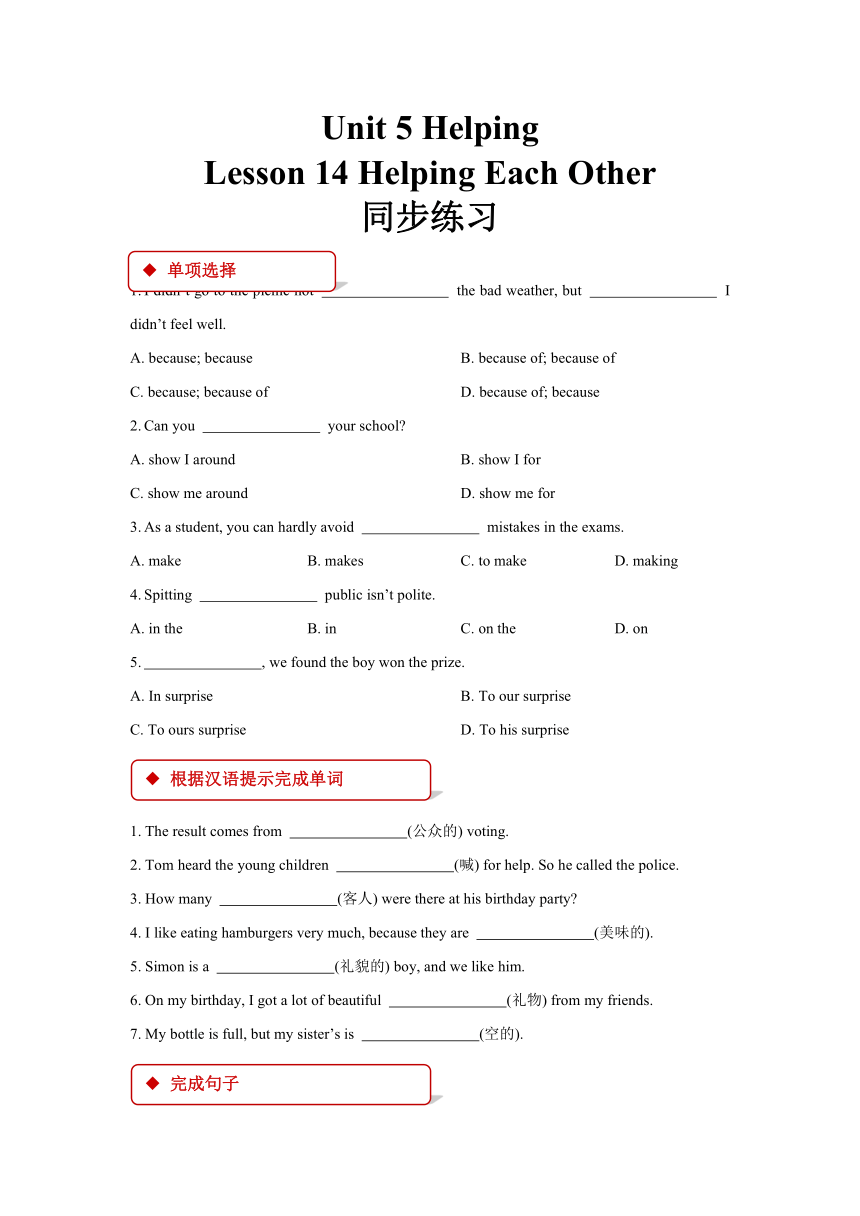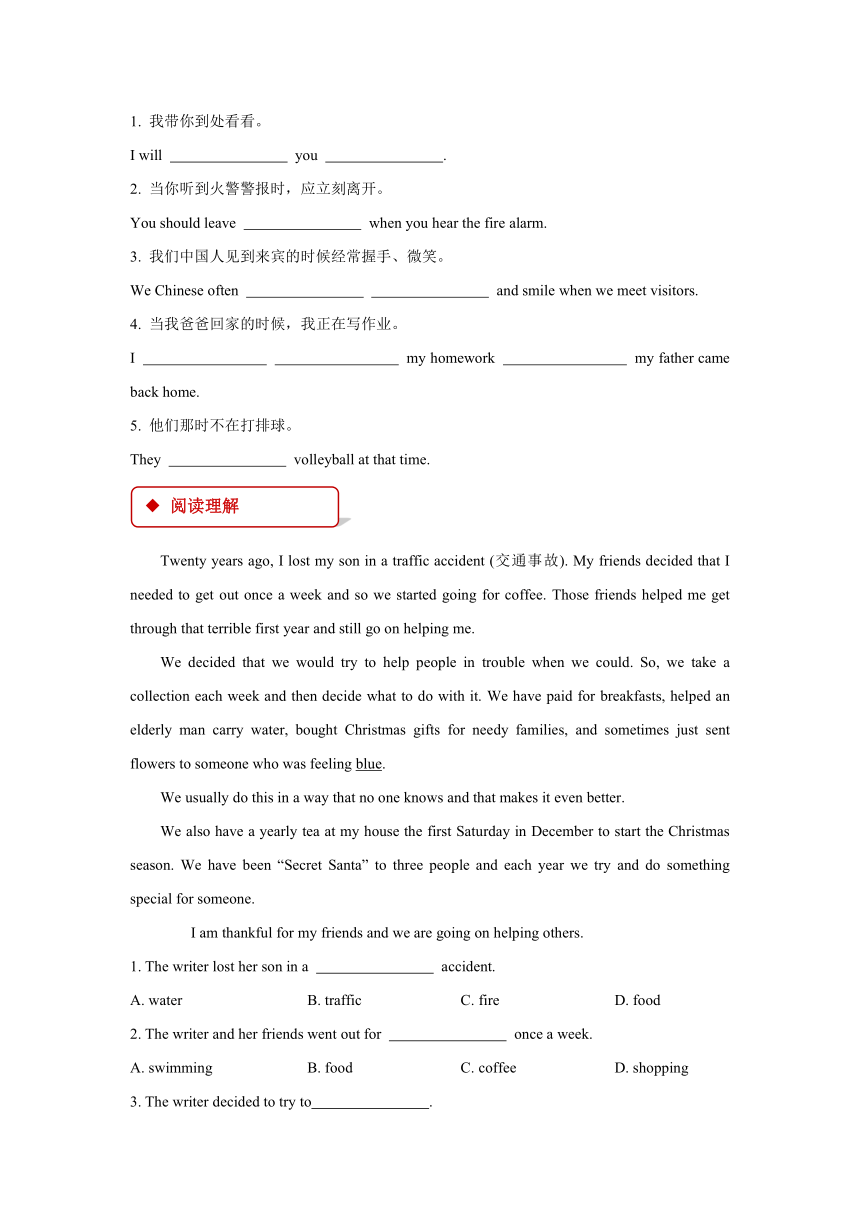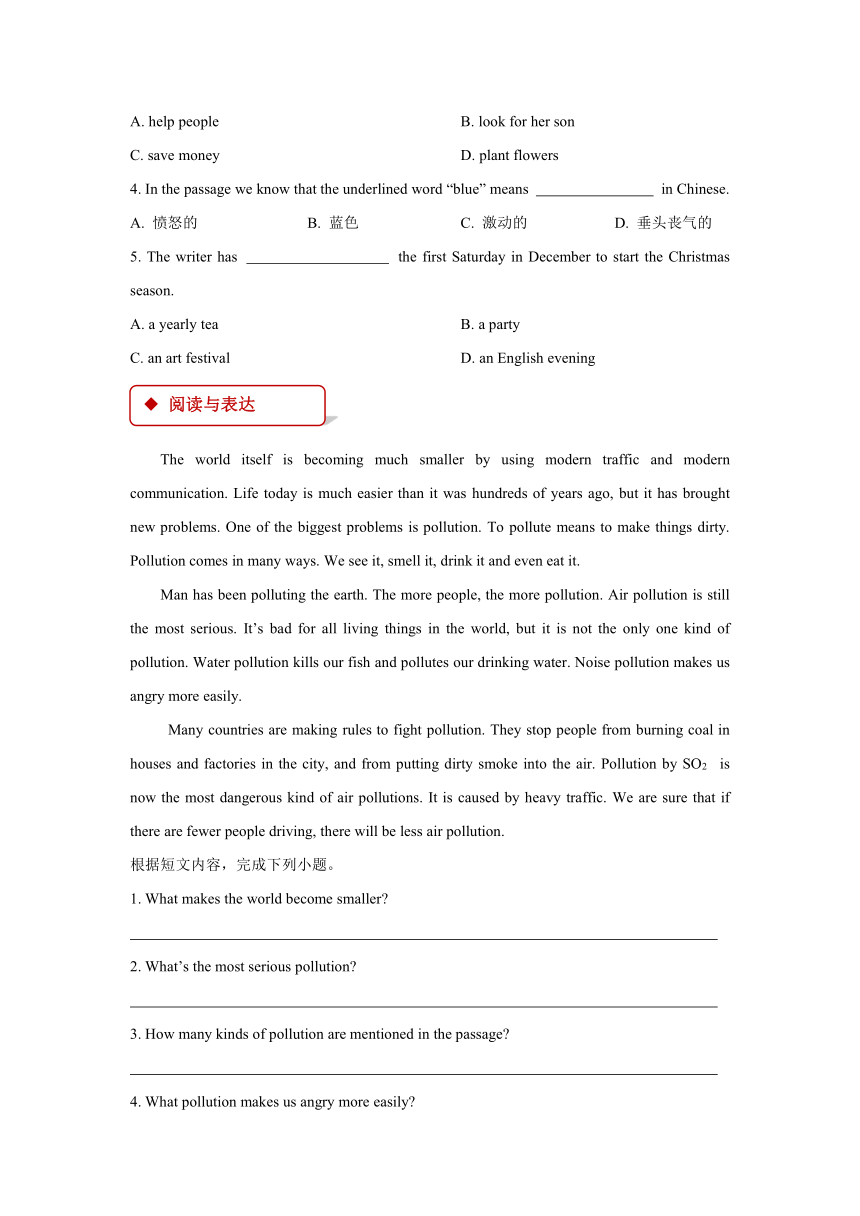Unit 5 Helping. Lesson 14 Helping Each Other.同步练习(含答案)
文档属性
| 名称 | Unit 5 Helping. Lesson 14 Helping Each Other.同步练习(含答案) |

|
|
| 格式 | zip | ||
| 文件大小 | 12.4KB | ||
| 资源类型 | 教案 | ||
| 版本资源 | 北师大版 | ||
| 科目 | 英语 | ||
| 更新时间 | 2018-07-07 15:30:19 | ||
图片预览



文档简介
Unit 5 Helping
Lesson 14 Helping Each Other
同步练习
1. I didn’t go to the picnic not ? the bad weather, but ? I didn’t feel well.
A. because; because B. because of; because of
C. because; because of D. because of; because
2. Can you ? your school?
A. show I around B. show I for
C. show me around D. show me for
3. As a student, you can hardly avoid ? mistakes in the exams.
A. make B. makes C. to make D. making
4. Spitting ? public isn’t polite.
A. in the B. in C. on the D. on
5. ?, we found the boy won the prize.
A. In surprise B. To our surprise
C. To ours surprise D. To his surprise
1. The result comes from ?(公众的) voting.
2. Tom heard the young children ?(喊) for help. So he called the police.
3. How many ?(客人) were there at his birthday party?
4. I like eating hamburgers very much, because they are ?(美味的).
5. Simon is a ?(礼貌的) boy, and we like him.
6. On my birthday, I got a lot of beautiful ?(礼物) from my friends.
7. My bottle is full, but my sister’s is ?(空的).
1. 我带你到处看看。
I will ? you ?.
2. 当你听到火警警报时,应立刻离开。
You should leave ? when you hear the fire alarm.
3. 我们中国人见到来宾的时候经常握手、微笑。
We Chinese often ? ? and smile when we meet visitors.
4. 当我爸爸回家的时候,我正在写作业。
I ? ? my homework ? my father came back home.
5. 他们那时不在打排球。
They ? volleyball at that time.
Twenty years ago, I lost my son in a traffic accident (交通事故). My friends decided that I needed to get out once a week and so we started going for coffee. Those friends helped me get through that terrible first year and still go on helping me.
We decided that we would try to help people in trouble when we could. So, we take a collection each week and then decide what to do with it. We have paid for breakfasts, helped an elderly man carry water, bought Christmas gifts for needy families, and sometimes just sent flowers to someone who was feeling blue.
We usually do this in a way that no one knows and that makes it even better.
We also have a yearly tea at my house the first Saturday in December to start the Christmas season. We have been “Secret Santa” to three people and each year we try and do something special for someone.
I am thankful for my friends and we are going on helping others.
1. The writer lost her son in a ? accident.
A. water B. traffic C. fire D. food
2. The writer and her friends went out for ? once a week.
A. swimming B. food C. coffee D. shopping
3. The writer decided to try to ?.
A. help people B. look for her son
C. save money D. plant flowers
4. In the passage we know that the underlined word “blue” means ? in Chinese.
A. 愤怒的 B. 蓝色 C. 激动的 D. 垂头丧气的
5. The writer has ? the first Saturday in December to start the Christmas season.
A. a yearly tea B. a party
C. an art festival D. an English evening
The world itself is becoming much smaller by using modern traffic and modern communication. Life today is much easier than it was hundreds of years ago, but it has brought new problems. One of the biggest problems is pollution. To pollute means to make things dirty. Pollution comes in many ways. We see it, smell it, drink it and even eat it.
Man has been polluting the earth. The more people, the more pollution. Air pollution is still the most serious. It’s bad for all living things in the world, but it is not the only one kind of pollution. Water pollution kills our fish and pollutes our drinking water. Noise pollution makes us angry more easily.
Many countries are making rules to fight pollution. They stop people from burning coal in houses and factories in the city, and from putting dirty smoke into the air. Pollution by SO2? is now the most dangerous kind of air pollutions. It is caused by heavy traffic. We are sure that if there are fewer people driving, there will be less air pollution.
根据短文内容,完成下列小题。
1. What makes the world become smaller?
? ? ? ? ?
2. What’s the most serious pollution?
? ? ? ? ?
3. How many kinds of pollution are mentioned in the passage?
? ? ? ? ?
4. What pollution makes us angry more easily?
? ? ? ? ?
5. Where does SO2? in the air pollution mainly come from?
? ? ? ? ?
“Have you finished your lesson, George?” Said Mr. Prentice to his son, who had laid aside his book and was busy making a large paper kite.
“No, father,” replied George, hanging down his head.
“1. ?”
“Because it is so difficult, father, I’m not sure that I shall never learn it. 2. ? My memory is so bad.”
“If I were to promise you a holiday on the thirtieth of the month after next, do you think you would forget the date?”
“3. ?”
“You are good at skating, and flying your kite, and playing footballs, are you not?” “Yes, father.”
“And you cannot learn your lesson! My dear boy, you are lying to yourself. 4. ?” “But have I not tried, father?” again asked George.
“5. ? Come, for this afternoon lay aside that kite you are making, and give another effort to get your lesson ready. Be serious, and you will soon learn it.”
A. No, I’m pretty sure that I should not.
B. You can learn as well as any one, if you will try.
C. It is easy.
D. Well, try again.
E. Besides (而且), I could not remember it after I had learned it.
F. If you don’t pay more attention to your lessons you will never be fit for anything.
G. Why not, my son?
参考答案
1. D 2. C 3. D 4. B 5. B
1. public
2. shouting
3. guests
4. delicious
5. polite
6. presents
7. empty
1. show, around
2. at once/right now/immediately
3. shake hands
4. was doing, when
5. weren’t playing
1. B 2. C 3. A 4. D 5. A
1. The use of modern traffic and modern communication.
2. Air pollution.
3. 3/Three.
4. Noise pollution.
5. The traffic.
1. G 2. E 3. A 4. B 5. D
Lesson 14 Helping Each Other
同步练习
1. I didn’t go to the picnic not ? the bad weather, but ? I didn’t feel well.
A. because; because B. because of; because of
C. because; because of D. because of; because
2. Can you ? your school?
A. show I around B. show I for
C. show me around D. show me for
3. As a student, you can hardly avoid ? mistakes in the exams.
A. make B. makes C. to make D. making
4. Spitting ? public isn’t polite.
A. in the B. in C. on the D. on
5. ?, we found the boy won the prize.
A. In surprise B. To our surprise
C. To ours surprise D. To his surprise
1. The result comes from ?(公众的) voting.
2. Tom heard the young children ?(喊) for help. So he called the police.
3. How many ?(客人) were there at his birthday party?
4. I like eating hamburgers very much, because they are ?(美味的).
5. Simon is a ?(礼貌的) boy, and we like him.
6. On my birthday, I got a lot of beautiful ?(礼物) from my friends.
7. My bottle is full, but my sister’s is ?(空的).
1. 我带你到处看看。
I will ? you ?.
2. 当你听到火警警报时,应立刻离开。
You should leave ? when you hear the fire alarm.
3. 我们中国人见到来宾的时候经常握手、微笑。
We Chinese often ? ? and smile when we meet visitors.
4. 当我爸爸回家的时候,我正在写作业。
I ? ? my homework ? my father came back home.
5. 他们那时不在打排球。
They ? volleyball at that time.
Twenty years ago, I lost my son in a traffic accident (交通事故). My friends decided that I needed to get out once a week and so we started going for coffee. Those friends helped me get through that terrible first year and still go on helping me.
We decided that we would try to help people in trouble when we could. So, we take a collection each week and then decide what to do with it. We have paid for breakfasts, helped an elderly man carry water, bought Christmas gifts for needy families, and sometimes just sent flowers to someone who was feeling blue.
We usually do this in a way that no one knows and that makes it even better.
We also have a yearly tea at my house the first Saturday in December to start the Christmas season. We have been “Secret Santa” to three people and each year we try and do something special for someone.
I am thankful for my friends and we are going on helping others.
1. The writer lost her son in a ? accident.
A. water B. traffic C. fire D. food
2. The writer and her friends went out for ? once a week.
A. swimming B. food C. coffee D. shopping
3. The writer decided to try to ?.
A. help people B. look for her son
C. save money D. plant flowers
4. In the passage we know that the underlined word “blue” means ? in Chinese.
A. 愤怒的 B. 蓝色 C. 激动的 D. 垂头丧气的
5. The writer has ? the first Saturday in December to start the Christmas season.
A. a yearly tea B. a party
C. an art festival D. an English evening
The world itself is becoming much smaller by using modern traffic and modern communication. Life today is much easier than it was hundreds of years ago, but it has brought new problems. One of the biggest problems is pollution. To pollute means to make things dirty. Pollution comes in many ways. We see it, smell it, drink it and even eat it.
Man has been polluting the earth. The more people, the more pollution. Air pollution is still the most serious. It’s bad for all living things in the world, but it is not the only one kind of pollution. Water pollution kills our fish and pollutes our drinking water. Noise pollution makes us angry more easily.
Many countries are making rules to fight pollution. They stop people from burning coal in houses and factories in the city, and from putting dirty smoke into the air. Pollution by SO2? is now the most dangerous kind of air pollutions. It is caused by heavy traffic. We are sure that if there are fewer people driving, there will be less air pollution.
根据短文内容,完成下列小题。
1. What makes the world become smaller?
? ? ? ? ?
2. What’s the most serious pollution?
? ? ? ? ?
3. How many kinds of pollution are mentioned in the passage?
? ? ? ? ?
4. What pollution makes us angry more easily?
? ? ? ? ?
5. Where does SO2? in the air pollution mainly come from?
? ? ? ? ?
“Have you finished your lesson, George?” Said Mr. Prentice to his son, who had laid aside his book and was busy making a large paper kite.
“No, father,” replied George, hanging down his head.
“1. ?”
“Because it is so difficult, father, I’m not sure that I shall never learn it. 2. ? My memory is so bad.”
“If I were to promise you a holiday on the thirtieth of the month after next, do you think you would forget the date?”
“3. ?”
“You are good at skating, and flying your kite, and playing footballs, are you not?” “Yes, father.”
“And you cannot learn your lesson! My dear boy, you are lying to yourself. 4. ?” “But have I not tried, father?” again asked George.
“5. ? Come, for this afternoon lay aside that kite you are making, and give another effort to get your lesson ready. Be serious, and you will soon learn it.”
A. No, I’m pretty sure that I should not.
B. You can learn as well as any one, if you will try.
C. It is easy.
D. Well, try again.
E. Besides (而且), I could not remember it after I had learned it.
F. If you don’t pay more attention to your lessons you will never be fit for anything.
G. Why not, my son?
参考答案
1. D 2. C 3. D 4. B 5. B
1. public
2. shouting
3. guests
4. delicious
5. polite
6. presents
7. empty
1. show, around
2. at once/right now/immediately
3. shake hands
4. was doing, when
5. weren’t playing
1. B 2. C 3. A 4. D 5. A
1. The use of modern traffic and modern communication.
2. Air pollution.
3. 3/Three.
4. Noise pollution.
5. The traffic.
1. G 2. E 3. A 4. B 5. D
同课章节目录
- Unit 1 Television
- Lesson 1 Last Week on TV
- Lesson 2 An Interview on TV
- Lesson 3 The Big Game
- Communication Workshop
- Unit 2 Teams
- Lesson 4 Class Projects
- Lesson 5 Teamwork
- Lesson 6 A Special Team
- Communication Workshop
- Unit 3 Faster,Higher,Stronge
- Lesson 7 Time to Exercise
- Lesson 8 Olympic Winners
- Lesson 9 Never Give Up!
- Communication Workshop
- Unit 4 Healthy Living
- Lesson 10 Going to the Doctor
- Lesson 11 Health Advice
- Lesson 12 Healthy Bones
- Communication Workshop
- Unit 5 Helping
- Lesson 13 Helping Your Community
- Lesson 14 Helping Each Other
- Lesson 15 A Young Hero
- Communication Workshop
- Unit 6 The Unexplained
- Lesson 16 Natural Abilities
- Lesson 17 True Stories?
- Lesson 18 Dreams
- Communication Workshop
